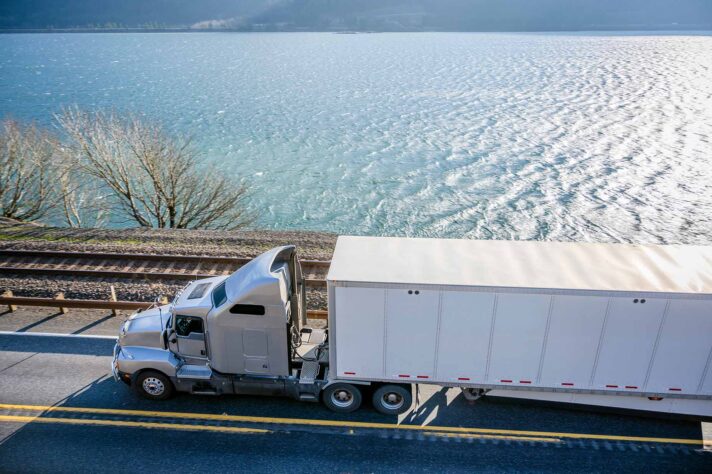Knowing the fact that the average American household has around 300,000 items means you’ll definitely need some strategy to pack your house for a cross-country move. Follow these simple but effective moving tips and tricks and relocate your household in no time, no matter how big or small it is.
Facilitating your relocation is always a good idea. Follow this simple advice and learn how to do it effectively!
After deciding where to live, feeling anxiety about relocating out is absolutely understandable since there are innumerous tasks to do before relocating to a new state. Starting from preparing your home for sale, looking for recommendations for relocation companies, trying to figure out if you have the right to relocation expenses deduction to exploring tools to help you check how safe your neighborhood is. Not to mention the whole process of getting a job in another state before relocating there.
All this is only a small glimpse into all the tasks that long-distance moving entails. Considering all the work ahead, it may look like a stress-free move is impossible. To convince you otherwise, we prepared the ultimate guide through packing tips & tricks that will help you move efficiently, avoid the most common relocation mistakes, and learn how to deal with relocation stress (or at least reduce it to the minimum), even if you’re moving last-minute.
Tip #1: First Things First – Prepare Mentally and Emotionally for the Upcoming Whirlpool of Changes
Relocating to another state alone can force you to face multiple challenges, from financial struggles, if you’re relocating without a job, to emotional instability caused by feelings of loneliness, nostalgia, melancholia when you are all alone miles away from your family and friends. All these feelings can be additionally intensified if you’re relocating during the holidays, even driving you to think should I move back home?
All this can be an introduction to relocation depression, which is more common than you could possibly imagine. And this could be especially hard for young people, who are just about to move out from their parent’s house and start living independently.
To mitigate possible negative effects, maybe for a start, you could consider living with someone. So check roommate websites and find a companion to help you adjust to a new country or state more quickly. If you’re an introverted type of person, then having a roommate is definitely a good idea, and one of the most certain ways to make friends in a new state.
Announce the Relocation and Say Goodbye Properly to Your Loved Ones
Telling your parents you’re relocating out of state is one of the most emotional and hardest things to say. For that reason, having a plan on how to announce your upcoming relocation to a big city and avoiding any sudden information is the most convenient way to do it. A serious conversation – even tears – is something to expect, so you better be ready for these hard feelings.
When it comes to telling your friends you’re relocating, the situation will likely be much more relaxed. Although they will be sad because you’re living, in some cases it will allow you to deepen the relationship with them. Regular calls, visits, and trips are very effective in nurturing relationships.
Being emotionally prepared for the move is essential
Tip #2: Preparation Is Half the Battle. Pack Only What You Need and Reduce the Costs Too!
Knowing what things to pack and include in the household inventory list is an essential step in preparations when moving cross country. The last thing you want to do when preparing to relocate to a new home is to box up stuff that won’t have any use-value there. So the very first thing to do when organizing your move is to decide what to get rid of, which is especially important if you’re relocating to a smaller home.
For instance, if you’re relocating from a house to an apartment, you definitely don’t want to pack all the tools from the shed. Household downsizing is also important because, by doing this, you can significantly reduce costs when relocating, since the expenses of relocation are calculated based on the inventory list.
Declutter the Home and Get Rid of All the Stuff You Don’t Need Anymore
Going room by room and sorting out things is of essential importance when preparing the household for a move. And this is applicable to everything you have, from the kitchen to furniture – everything should be taken into consideration.
Separating stuff into four categories like throw away, recycle, donate unwanted items, and pack will help you make decisions more quickly and easily and estimate the value of household goods. It would be also very helpful if your stuff could get a second chance, and someone who is in need of it can use it. So exploring all the local charities where you can donate furniture, clothes, appliances, or even food will be the most generous way to exclude those goods from your packaging list.
Bonus tip: Decluttering is pretty demanding and time-consuming to organize, so don’t leave it for the last minute! Going through your belongings at least three months before the relocation date is a minimum for quality organization!
Learn What Movers Won’t Move Due to Law Restrictions
Relocation companies aren’t allowed to accept everything on the truck, and the restrictions are usually applied to all live and hazardous things. The possessions that can give you the most headaches are definitely plants. So finding an alternative on how to move house plants long-distance will be a must, as well as finding a pet-friendly carrier in case you’re relocating with pets. Also, if you have some weapons, learning how to move a gun safe (as well as its contents) is required, so don’t forget about these details.
Don’t Forget to Deal With Paperwork!
Organizing important papers before the relocation and dealing with paperwork is a great opportunity to get it all over with. Change your address when you move using the USPS online system because we are sure you don’t want the next tenants to have to figure out how to stop getting mail for previous residents. Also, explore how to transfer utilities and create a list of who to notify when relocating, including the IRS, banks, insurance companies, and all other related institutions.
If you’re about to rent a flat, you might need some extra documentation. Check what you need to rent an apartment in terms of documentation and prepare it on time. In case you’re moving a business to another state along with the household, there will be even more paperwork, so there is another task on your relocating to-do list!
Preparations are essential to accelerate and facilitate the relocation and packaging process
Tip #3: Set up the New House
Setting up the future home for life will happen simultaneously with preparing the old house. Although it might seem almost impossible to deal with both tasks, with a proper strategy, everything is manageable. Create a list of all the stuff needed to equip the next place, consult an interior designer to provide you with a plan for some special requests like creative storage ideas, and explore the best techniques to babyproof a house in case you’re relocating with kids. If you need more advice on how to make your house a secure place for children, take a look at the video below!
Tip #4: Budget All the Costs You Can Estimate
No matter what your reasons to move are, whether your job requires relocation, you’re about to perform a military move, or you’re preparing to move for a relationship, having a relocation budget is essential. Include all the details in the calculation, like how much movers cost for a one-bedroom apartment or a house, all the hidden expenses, cost of travel, renting a storage unit, transportation of your pets, and everything else that crosses your mind.
Of course, the only way to know your costs exactly is to do a house inventory after you finish decluttering and get a quote from a reliable long-distance moving company.
Budget your move and know how much money you should prepare!
Tip #5: Find a Job Before Relocation
As relocation statistics suggest, one of the most common reasons for relocation is job-related. Almost 11% of people who relocate do it because they’ve got a job in a new city and a chance for career advancement. Finding a job when relocating to another state is not easy to do. Matching your needs and expectations with a company’s vision can be tricky. Still, getting a job before you move is highly recommended because it will provide you with financial stability, which is crucial for dealing with all the changes you’re going through.
In the end, don’t forget that your colleagues can help you adjust to different environments and make friends in the new city. So create that fabulous CV and send it to the most successful companies in the area you plan to relocate to!
Explore all options for getting employment before the relocation
Tip #6: How Can I Make Moving Out Easier? Establish a Packing Strategy – Use Boxes and Bubble Wrap Generously
Boxing up the household without a plan is the worst scenario you could choose. The best tip for packaging quickly is to plan everything in advance and always remember to box up all the belongings according to priority, since you’ll also have to unpack after the move. And this will be one of the first things to do after relocating.
Creating packaging and no-packaging zones in the house and boxing up the belongings going room by room is definitely one of the strategies we’d recommend. Here is how to properly prepare to package belongings using different types of packaging materials, which will allow you to protect the stuff in storage units and ensure they’ll get to your next address undamaged.
Use a Checklist of All Items to Be Packed to Follow the Progress
Making a checklist of all belongings to be packed is the most effective technique to prepare for movers. And when speaking of packing and moving tips, here comes another – divide the list into categories to follow the packaging process more easily:
- Packaging fragile items – mirrors, decorations, or even the china cabinet,
- Packaging kitchen items – this is maybe the most demanding part of the process, which will entail packaging all dishes. This means packing all glassware, as well as pots and pans that have use-value.
- Packaging electronics – people usually shorten this list to packaging the computer. However, it should entail all gadgets like cameras, tablets, TVs, and game consoles.
- Packaging clothes – another category that will require quite some time to box it up. The same applies to packaging shoes.
- Packaging books,
- Packaging bathroom items – including toiletries and other personal hygiene products. This category could also entail packaging makeup.
What Should You Move First When Moving?
To provide enough space for the cross-country movers to move around the house and load the belongings into the truck, the first thing to tackle is relocating furniture. Since all the pieces are usually robust, if you plan to move them, you’ll have to learn how to pack furniture first. Of course, if you find it too complicated, your long-distance movers will assist you or even take care of every piece. Also, it would be great to get some very valuable or bulky items out of the house, so relocating a piano should be high on the list of priorities.
Get All the Protective Packing Materials, Best-Sized Boxes, and Labels
No matter which belongings you plan to pack, you’ll need a variety of packing materials. Here are some materials to get before starting the packaging process:
Some of those materials can be expensive. For example, to buy all boxes for relocating, you’ll have to set aside over $400 for the median household. So acquiring some alternative materials is always a good idea. However, you should not spare a cent when it comes to the packaging of paintings or some other valuables, such as packaging silverware, sculptures, or pieces of antique furniture. Last but not least, remember to take a photo inventory of all valuables so you can prove their original condition in case of damage.
Don’t Forget to Pack an Essential Box for the Big Day!
One of the best relocating day tips to follow is to prepare for the first couple of days after you enter your next home. For that reason, packaging a box of relocation essentials that will contain some linen, pillowcases, kitchen utensils, and hygiene products for a pleasant stay in your future house is an awesome solution while you’re waiting for your goods to arrive.
When Should I Start Packing to Move? Set a Proper Timeline
When it comes to initiating the packaging process, it is highly recommended to start organizing it at least three months prior to your relocation date. This is a pretty demanding task to tackle, so don’t expect to finish it quickly and don’t rush it. Be sure that everything you wanted is packed and ready to move!
Learn all techniques and establish a strategy to accelerate the whole process of relocation
Looking for the Best Tips for Moving? Choose a Reliable Cross-Country Moving Company
Having all those tasks on your plate can be pretty overwhelming. Having professional movers to provide you with all the cross-country moving services will definitely make things easier. Not only will they guide you through the whole process, but they will also advise you on some crucial dilemmas such as what the best time of year to move is, why you should avoid relocating in winter although this is the cheapest time of the year to move, and what the best option for transporting a car across the country is.
Having a professional company to cover all long-distance moving services including auto shipping will also provide you with beneficial prices and conditions. So before confirming any quote, make sure to explore how car shipping works, what trailer to use for the cheapest way to move out of state, and if there are any special requirements when it comes to car preparation for shipping.
Knowing all the details, researching the company’s reputation on the internet, and asking about the exact relocation company’s hourly rate is the surest way to stay away from relocation scams and enjoy all the benefits of relocating!










